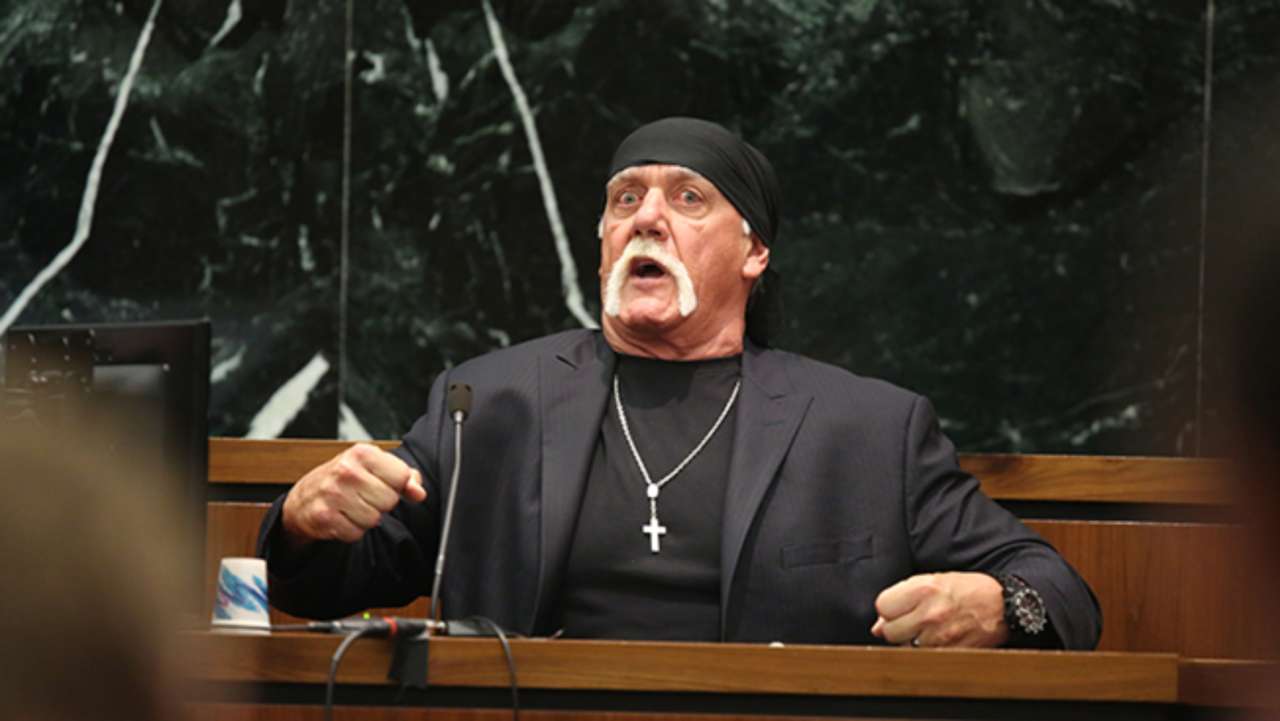Brian Knappenberger’s Nobody Speak: Trials of the Free Press, which just hit Netflix, originally held the more sensational (and unwieldy) working title Nobody Speak: Hulk Hogan, Gawker and Trials of A Free Press upon its Sundance premiere. Shot during the run-up to the 2016 election, the film takes as its starting point the salacious Florida trial pitting the now disgraced, titular WWE hero against bad boy Nick Denton’s Gawker Media (a site that none other than the New York Times’s David Carr likens in the film to the “mean girls in a playground” – while copping to reading it).
For those who somehow missed the judicial circus down south, a quick recap: Charges against Gawker were brought in the wake of the site’s posting of a sex tape involving Hogan (or rather, the man behind the character, Tampa’s own homeboy Terry Bollea) and the wife of his best friend (that would be radio personality Bubba the Love Sponge Clem). After some mind-bending testimony – in which it was revealed that Bollea’s penis size is actually much smaller than Hogan’s, in case you were wondering – the jury awarded the former pro wrestler a jaw-dropping $115 million in compensatory damages, and another $25 million in punitive damages. Not so surprisingly, Gawker filed for Chapter 11 a few months later, sold off its assets, and now the site is no more.
But behind the titillating scenes lurked something, or rather someone, much more nefarious – the Silicon Valley venture capitalist Peter Thiel. With an axe to grind with Denton – ever since the Gawker founder, himself gay, outed Thiel at the site – Thiel, it turns out, had been the one anonymously footing the bill for Bollea, giving Team Hogan the money muscle to put Gawker out of business. But, as Nobody Speaks makes clear, Thiel is far from the only billionaire effectively silencing, and controlling and shaping, as Trump would have it, “the lying media.”
While Knappenberger dutifully delves into the Bollea v. Gawker suit – the film includes interviews with most of the players, including the Gawker folks, Hogan’s litigation lawyer David Houston, as well as a First Amendment lawyer – the doc doesn’t really get intriguing until the second half. That’s when an even more convoluted story appears onscreen – the secret sale of Nevada’s over-a-century-old Las Vegas Review-Journal. As Thiel was wielding his wealth to crush a longtime enemy, another magnate out west was anonymously using his as a means to acquire political influence.
What makes this particular tale so fascinating is that it was the Las Vegas Review-Journal’s fearless journalists themselves who risked everything to doggedly investigate, and subsequently unmask, casino mogul Sheldon Adelson as the man behind the purse strings. So it’s a shame Knappenberger, who interviewed the journalists, doesn’t further explore their actual detective work in the film.
Long story short: An entity named News + Media Capital Group, whose only face was an unknown newspaper guy named Michael Schroeder, paid the ridiculous sum of $140 million for the paper – mere months after it had been scooped up by another corporation in a deal (that had also included seven daily broadsheets and 65 local weeklies) for only $102.5 million. Which immediately got the reporters at the R-J suspecting that Las Vegas Sands CEO Adelson, a Republican mega-donor who also owns a right-wing Israeli tabloid, was the true purchaser.
Indeed, there had been ominous signs even before the sale was finalized – which Knappenberger neglected to include, yet show precisely how a billionaire can quietly attempt to exert influence from behind the scenes. As had already been deftly reported in The New Yorker, a request to editors from the higher-ups at GateHouse Media (the previous owner, which at the time was in negotiations with News + Media) to keep an eye on a few Nevada judges – including one who presided over a nasty wrongful-termination case against Adelson’s company – raised eyebrows. When no dirt turned up, the executives inexplicably wouldn’t let it lie. Instead they forwarded a badly written story from a small Connecticut newspaper that condemned the judge in question’s record. Of course, rather than dig further into the judge’s history, the whip-smart journos decided to investigate why on earth a Connecticut newspaper no one had ever heard of was interested in a Las Vegas justice. And crucially, who owned that newspaper.
Next thing you know a mystery man named Michael Schroeder stopped by to address the staff about the new owners, who he was representing but declined to name. He himself happened to be the owner of four Connecticut newspapers – including the one that contained the article about the judge. (A little further digging revealed that Schroeder was actually also the guy behind the pseudonymous byline on the piece!) Adelson was then outed by reporters who handily connected his son-in-law to the deal – and Adelson himself to News + Media. Suddenly, laughable requests from corporate parents looked chilling in hindsight. And equally disturbing as the death of Gawker is the fact that the Las Vegas Review-Journal continues to publish today. It’s a zombie paper run by a Trump advisor, every one of those veteran journalists gone.

